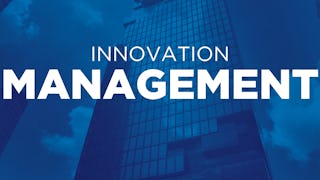This third course in the product development specialization discusses the business side of product development. The course begins with an overview of marketing and pricing strategies, and how company’s price their products today. Learners are then introduced to the project’s financial business case, defining key financial metrics such as NPV, IRR and Payback Period. The course then shows how to make an effective presentation these to the executive office for funding. The course concludes with a discussion of sustainability and how to design innovative products for a circular economy. Throughout the course, the student is challenged to continue developing their own product idea, one they have followed throughout the specialization.



Product Innovation Management
This course is part of Product Development for Technical Managers Specialization

Instructor: Michael J. Readey, Ph.D.
Included with 
Recommended experience
What you'll learn
How to design a compelling marketing brochure.
How to create a spreadsheet of a financial business case.
How to construct a prototype of your product concept.
Details to know

Add to your LinkedIn profile
3 assignments
See how employees at top companies are mastering in-demand skills

Build your subject-matter expertise
- Learn new concepts from industry experts
- Gain a foundational understanding of a subject or tool
- Develop job-relevant skills with hands-on projects
- Earn a shareable career certificate


Earn a career certificate
Add this credential to your LinkedIn profile, resume, or CV
Share it on social media and in your performance review

There are 5 modules in this course
Module 1 begins with an overview of the course and how it works. It then introduces several principles of Marketing, including the 4 and 5 "P's" of marketing. The course then looks at pricing strategies and how companies establish price. Customers within a market buy for different reasons, and the idea of market adoption is introduced with segments such as Innovators, Early Majority, and the Laggards. The module concludes with students constructing a tri-fold marketing brochure suitable for a tradeshow event.
What's included
9 videos5 readings1 assignment1 peer review1 discussion prompt
Module 2 introduces the process for creating a financial business case for a product development project. This involves estimating future sales, costs and then based on the resulting cash flows, the project's financial viability using financial metrics such as NPV, IRR and the Payback Period.
What's included
9 videos1 assignment1 programming assignment
Module 3 shows the steps to prepare a product development presentation proposal suitable for presentation to upper management or investors.
What's included
4 videos1 peer review
Module 4 introduces the concept of the Circular Economy, and how it differs from today's Linear Economy. The 3 Principles of the Circular Economy are described using examples of how they are applied. A more detailed view of the Circular Economy is presented using the Ellen MacArthur Foundation's Butterfly Diagram, highlighting the Technical and Biological Nutrient Cycles as foundational to circular product design.
What's included
5 videos1 assignment1 peer review
Module 5 links product development to environmental and social sustainability. The module begins by providing an overview of the sustainability imperative, essentially arguing why we as product developers need to focus on more sustainable products and services. The concept of "The Anthropocene" is introduced, as a description of how human activities are now shaping the planet's natural processes. Sustainability is then defined in terms of environmental and social responsibility. The module concludes with an overview of sustainable products, beginning with a case study of a typical t-shirt.
What's included
8 videos1 reading
Instructor

Offered by
Explore more from Leadership and Management


University of Colorado Boulder


Erasmus University Rotterdam


Fundação Instituto de Administração


University of Colorado Boulder
Build toward a degree
Why people choose Coursera for their career




New to Leadership and Management? Start here.

Open new doors with Coursera Plus
Unlimited access to 10,000+ world-class courses, hands-on projects, and job-ready certificate programs - all included in your subscription
Advance your career with an online degree
Earn a degree from world-class universities - 100% online
Join over 3,400 global companies that choose Coursera for Business
Upskill your employees to excel in the digital economy
Frequently asked questions
Access to lectures and assignments depends on your type of enrollment. If you take a course in audit mode, you will be able to see most course materials for free. To access graded assignments and to earn a Certificate, you will need to purchase the Certificate experience, during or after your audit. If you don't see the audit option:
The course may not offer an audit option. You can try a Free Trial instead, or apply for Financial Aid.
The course may offer 'Full Course, No Certificate' instead. This option lets you see all course materials, submit required assessments, and get a final grade. This also means that you will not be able to purchase a Certificate experience.
When you enroll in the course, you get access to all of the courses in the Specialization, and you earn a certificate when you complete the work. Your electronic Certificate will be added to your Accomplishments page - from there, you can print your Certificate or add it to your LinkedIn profile. If you only want to read and view the course content, you can audit the course for free.
If you subscribed, you get a 7-day free trial during which you can cancel at no penalty. After that, we don’t give refunds, but you can cancel your subscription at any time. See our full refund policy.
More questions
Financial aid available,


